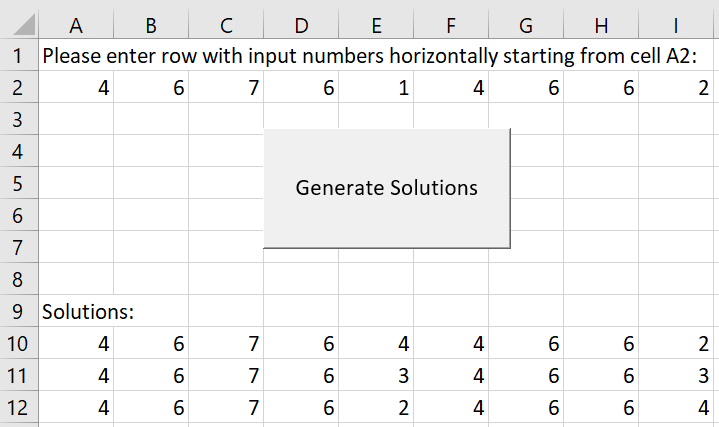Abstract
Suppose you have a row with 9 numbers. The average is always calculated as an integer (rounded down). Can you list all possible combinations of minimal value increases to reach the next higher average, if you are only allowed to increase numbers up to the current average?
Example

Appendix Sub Combinations Code
Please read my Disclaimer.
Options Explicit
Sub Combinations()
'Source (EN): http://www.sulprobil.de/combinations_which_increase_average_en/
'Source (DE): http://www.berndplumhoff.de/combinations_which_increase_average_de/
'(C) (P) by Bernd Plumhoff 29-Jun-2020 PB V0.1
Dim i As Long, j As Long
Dim lCount As Long, lSumTarget As Long, lAvg As Long
Dim dAvg As Double
Dim v As Variant, vMax As Variant, vMin As Variant
With Application.WorksheetFunction
j = 10
v = Range(Cells(2, 1), Cells(2, 1).End(xlToRight))
lCount = UBound(v, 2) - LBound(v, 2) + 1
dAvg = .Average(v)
lAvg = .RoundDown(dAvg, 0)
lSumTarget = .RoundDown(dAvg + 1#, 0) * lCount
vMax = v
For i = 1 To lCount
If vMax(1, i) < lAvg Then vMax(1, i) = lAvg
Next i
vMin = v
Range("10:65536").Delete
Select Case .Sum(vMax)
Case Is < lSumTarget
[A10] = "There is no solution."
Case Is = lSumTarget
Range(Cells(j, 1), Cells(j, lCount)).FormulaArray = vMax
Case Else
i = 1
Do While i <= lCount
Do While v(1, i) = vMax(1, i)
i = i + 1
If i > lCount Then Exit Sub
Loop
v(1, i) = v(1, i) + 1
Do While i > 1
i = i - 1
v(1, i) = vMin(1, i)
Loop
If .Sum(v) = lSumTarget Then
Range(Cells(j, 1), Cells(j, lCount)).FormulaArray = v
j = j + 1
End If
Loop
End Select
End With
End Sub